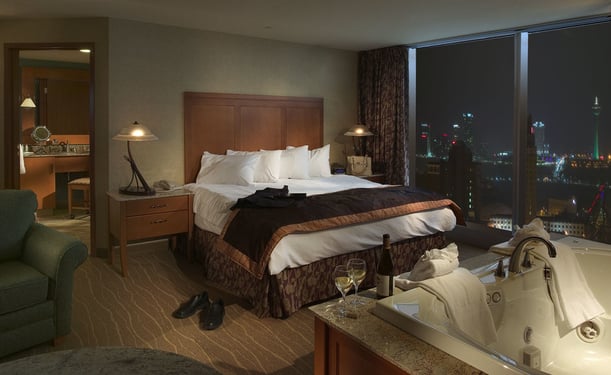
Hotel guests today want to experience the best of many different worlds. Hotel guests of tomorrow will still want the same experience. Future guests, however, will want even more streamlined and technologically tailored to them during their stay.
But this raises plenty of bigger questions.
How do you please anticipated guests and their needs when it’s nearly impossible to know exactly what they’ll be? How do you reimagine hotel furniture to cover a range of form-and-function experiences? Is there a way to future-proof your investment in casegoods?
While no one has a crystal ball, there are some timeless design elements that help you meet future trends in the hospitality industry, such as: Incorporate these design trends into your hotel rooms and casegoods furniture:
-
Style
-
Comfort
-
Technology
-
Wellness
-
Personal preference
Following these design trends will help you delight guests today and prepare for their needs tomorrow. Let’s think outside the box.
Heading Off Future Trends in the Hospitality Industry for Your Rooms & Casegoods
The good thing about custom hotel casegoods furniture is it’s, well, customizable. An order – whether it’s for 1 guestroom or 100 – can be made to whatever specifications you need it to be.
The comforts and amenities that are in a guest’s mind should be what’s foremost in your mind: feeling home while away from home.
Needless to say, creating an experience that lends itself to feeling at home helps guests feel comfortable and encourages them to book another stay with your hotel brand.
-
Work and stay space optimization
-
Upgraded communal workspaces
-
Health and wellness amenities
-
Customizable stays
-
Modular casegoods
-
Environmental sustainability
-
Easily cleaned casegoods
1. WORK AND Stay SPACE OPTIMIZATION
Typical hotel rooms don’t provide a lot of space to create that “home-away-from-home” feeling. That’s where space optimization comes in. Block out areas for the essentials and rethink what isn’t essential anymore.
For example, do business travelers even use in-room desks anymore?
Yes and no. While they weren’t so much a few years ago, the pandemic changed that. Initially, it was for social distancing purposes. But now with more workers going hybrid, they’re taking a more nomadic approach to their 9-5, traveling and working. “Bleisure” (business & leisure), if you will.
They’re more likely to work on the move and require constant, connectivity. What they do need are ample, easily accessible power and data sources - both electrical outlets and USB ports.
Do guests fill the drawers of bedside stands with their personal effects anymore?
Not really. They could, however, use a small pull-out platform to set their laptop or tablet device on to charge, though.
Casegoods furniture like headboards, cupboards, and stands can be mounted to the wall to save floor space.
2. Upgraded Communal Workspaces
While business travelers are not particular anymore about the physical location they’re working from, they’re now expecting a bit more from workspace amenities elsewhere in a hotel.
In short, your business center can’t be a desk with a printer that hasn’t had a toner replacement in years. Rather, remote workers are looking for clean, comfortable spaces with all the amenities (ample power, lighting, etc.) while still having some spaces that offer privacy. Essentially, the hotel business center of today and the future is one that’s essentially a coworking space.
3. HEALTH AND WELLNESS Ammenities
Many 21st-century hotel guests are fighting back against sedentary lifestyles and poor diets, a meeting guests who are adopting better health habits.
The simple fact is that more guests are looking for more from their hotels to meet their health and wellness needs. The almost never-used fitness center isn’t cutting it anymore.
Does your hotel design and casegoods furniture incorporate their fitness and other health needs? Could you optimize space or reconceptualize furniture to fit healthier lifestyles?
Guests also prize privacy and are more likely to prefer working out in their rooms, if given the option. Remember the following key points:
-
In the world of multifunctionality, a luggage bench can also be a weight bench
-
Streaming technology lets guests watch their favorite exercise programs anytime, anywhere
-
Vertical space is workout space (think wall mounts and resistance bands)
In hotel rooms of the near future, virtual reality technology will likely be as common as an alarm clock. Guests could run through the 3D environments like the Grand Canyon from the comfort of their rooms. The furniture and other elements of your design must provide the space and tech accessories to do so.
4. Customizable Stays
The one-size-fits-all room and hotel stay is slowly going away.
A guest walks into Room 216 on a Tuesday and it’s a comfortable 68 degrees, just as he likes it. Another guest walks into Room 216 on a Wednesday and it’s a comfortable 71 degrees, just as she likes it.
Sound like something that’s ahead by a century? Nope. Customizable environments via cloud technology will await guests of the future, too. Techy hotel design trends could also include individualized:
-
Circadian LED lighting
-
Entertainment options
-
Interior decor
5. Modular Casegoods
Along the same lines as our last point, the layout of a room for one guest might not work so much for another.
Modular casegoods meet the needs of all guest as can be easily reconfigured or updated to meet changing guest preferences and functional requirements. The modular approach not only enhances room aesthetics by allowing for easy updates, but it also offers cost-effectiveness over time, as components can be individually replaced or upgraded without the need for complete furniture overhauls.
In addition, modular casegoods facilitate quicker room turnaround for maintenance and updates – an important consideration for hotels looking to minimize downtime and enhance guest experience continuously.
6. ENVIRONMENTAL SUSTAINABILITY
More than 70% of U.S. travelers consider environmental impacts before booking a hotel. They want to know your brand prioritizes green initiatives, especially when it comes to hotel furniture. They’re not entirely interested in just reusing towels.
The good news: Many hotels actively seek casegoods furniture manufacturers that are Forest Stewardship Council (FSC) certified. This will likely remain the case for hotel design trends for years to come as guests seek peace of mind knowing wood harvested for furniture is:
-
Sourced responsibly
-
Replenished to protect habitats
-
Free of harmful chemicals
-
Recycled
7. Easily Cleaned Casegoods
If the pandemic brought one thing to the forefront of all of our minds, it’s being more conscious about cleanliness.
The last thing anyone wants is to step into a hotel or guest room where they quickly start to question how clean it is.
Regardless of what hotel casegoods and other furnishings look like from a design standpoint, hotel FF&E in the future should be made from materials that are easy to clean and sanitize (think laminate & veneers).
Future Trends in the Hospitality Industry: Creating Custom Environments
Straight-line design and minimalist decor dominate today’s hospitality design trends. They’ll continue to well into the future. But understated doesn’t have to mean under-functional. Sacrificing doesn’t mean compromising guest experience.
An experienced hotel casegoods furniture manufacturer can factor useful elements and current trends into your design - from space optimization to health and wellness. Expect ROI from guest satisfaction.

